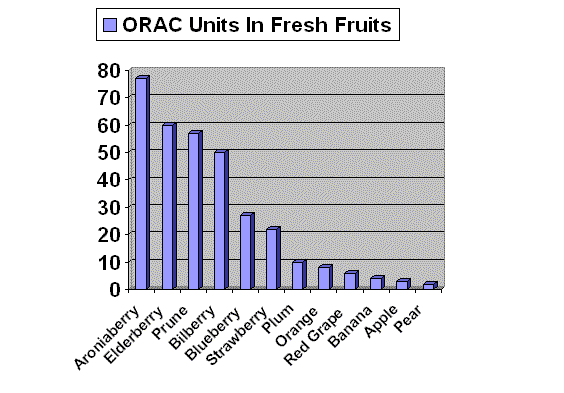Antioxidants
Antioxidants are an integral part of maintaining good health, especially with respect to aging and age related disorders. Scientists have found that antioxidants increase our resistance to disease and boost our immune systems.(1)
ORAC (Oxygen Radical Absorbance Capacity) is a method of measuring the overall antioxidant power of foods and supplements.

Antioxidants is a buzzword you've probably heard but may not fully understand. Antioxidants are plant chemicals (phytochemicals) that have the power to neutralize free radicals - unstable compounds generated by our bodies (and found in pollutants like cigarette smoke) that can wreak havoc with our health.
When you have a situation where your antioxidants are inadequate to fight the free radicals your body is creating you have a condition called oxidative stress. Free radicals cause oxidative damage to human cells and therefore can trigger heart disease, diabetes and cancer.
Many of the fruits listed in this book contain antioxidants along with other powerful phytochemicals, and as research continues, we continue to realize their importance to good health.
According to Dr. Ronald Prior of the US Department of Agriculture Research Service at Tufts University, "a significant increase in antioxidants of 15 to 20 percent is possible by increasing consumption of fruits and vegetables, particularly those high in ORAC value."
However, in order to have a significant impact on plasma and tissue antioxidant capacity, we can only meaningfully increase our daily intake by 3,000 to 5,000 ORAC units. Any greater amount is probably redundant because the antioxidant capacity of the blood is tightly regulated. Therefore, the benefit that can be derived from antioxidants does have an upper limit.
References 1. McBride, Judy. (1999). ORAC: Brain Nutrition for Memory and Learning. Retrieved on November 3, 2007 from http://hcneurology.com/Documents/ORACresearchhcneurology.doc



